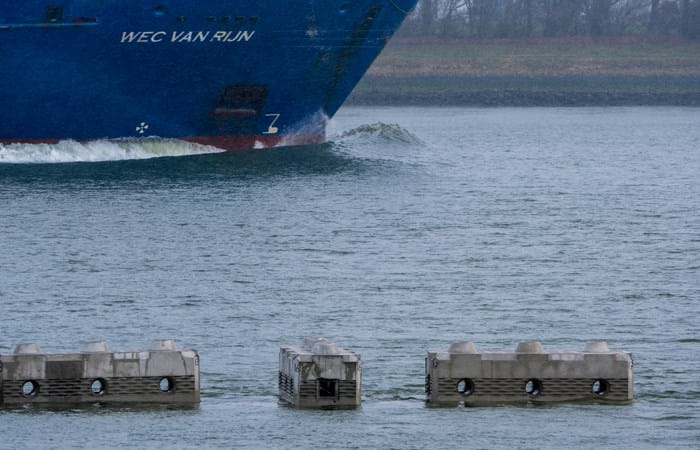The Boskalis Artificial Reefs Program (ARP) is a research program aimed at understanding and applying the ecological, hydraulic and economic benefits of artificial reefs. The program consists of three key pillars: knowledge development, network creation and detailed engineering. The ARP offers a unique platform to exchange concepts and develop fit-for-purpose designs for our clients.
Following pilot programs in Monaco, Panama and Kenya, the ARP’s research has shifted to the New Waterway, the Port of Rotterdam’s main entrance channel. A modular artificial reef has been installed in the channel to investigate its potential for protecting shore banks from the bow waves of large vessels. The reef also serves to enrich the biodiversity of the local marine ecosystem and act as an ecological steppingstone between the saline and freshwater environment.
The reef comprises 17 interlocking blocks weighing approximately six and a half tons each. They are made from sustainable concrete with a special surface texture designed to attract oyster beds and mussel colonies. The reefs have been designed and produced by Reefy, a Dutch start-up, and were installed by Boskalis with support from Rijkswaterstaat (the executive agency of the Dutch Ministry of Infrastructure and Water Management) and Rotterdam Municipality.
“The sheer size and weight of these modular units makes them capable of withstanding wave energy whilst creating habitat, a rare combination,” said Paul Peters, Program Lead of the ARP. The concept fits within the ARP program, which aims to develop and apply large-scale, modular artificial reefs for maximum positive impact within the context of Boskalis’ proposition as a marine contractor. By acting as breakwaters for wave energy, artificial reefs can provide an alternative form of coastal protection. Through the restoration of habitat complexity in degraded coral and oyster ecosystems, they enhance the resilience of marine habitats.
In this context, the Rotterdam New Waterway is the fourth ARP pilot site and the first in the Netherlands.
“It all started with intensive collaboration between the different parties involved to think about further ecological innovations in coastal and riverbank protection,” explained Ebo de Vries, Innovation Manager at Boskalis Netherlands. “This project focuses on learning from the entire chain: from the production of the blocks to the monitoring of the reef.”
If the New Waterway trial is successful, several potential applications of the concept are anticipated among Boskalis’ clients and project owners, both in the Netherlands and internationally. Rijkswaterstaat has already expressed its interest in upscaling the application of the technology.
De Vries added: “Wherever (coastal) erosion is a problem, this is an option that can serve as an alternative for conventional concrete defenses. It has the same technical function and performance but with much more ecological value.”
Engage with our program
Please visit our website (boskalis.com/artificialreefs) for frequent updates on the pilot projects, as well as our latest artificial reef designs and partnerships.
